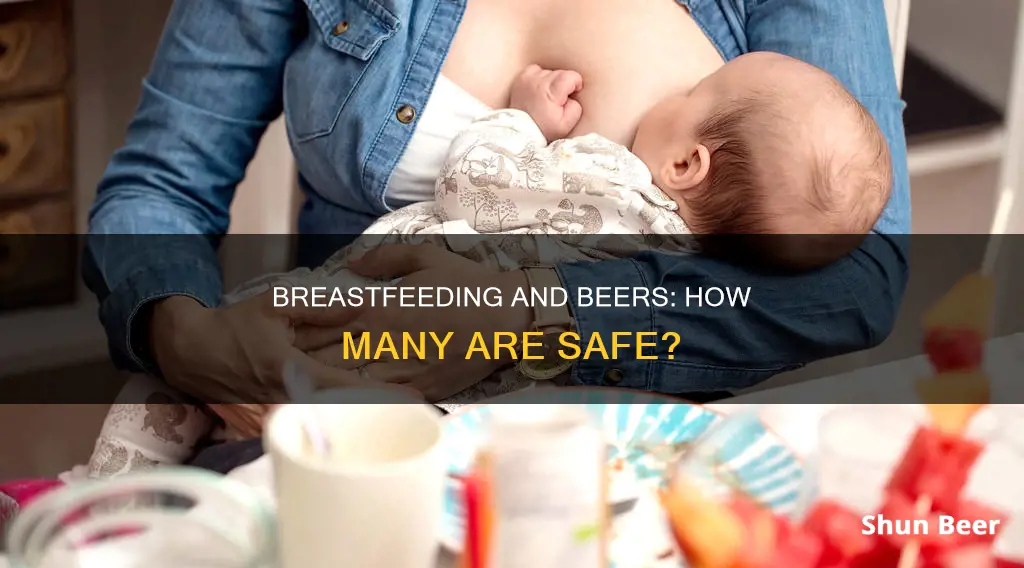
There are many conflicting opinions on whether or not it is safe to drink beer while breastfeeding. While some sources suggest that drinking in moderation will not harm the baby, others recommend abstaining from alcohol altogether. According to the Centers for Disease Control and Prevention (CDC), the safest option while breastfeeding is to avoid consuming alcohol entirely. However, the occasional drink is generally considered acceptable, as long as it is timed correctly and the mother waits long enough for the alcohol to metabolize before nursing. The general guideline is to wait for at least two hours per drink before breastfeeding again.
| Characteristics | Values |
|---|---|
| How much alcohol can be consumed while breastfeeding? | It is recommended to cut out drinking completely or limit alcohol consumption while breastfeeding. One drink per day has not been found to be harmful to a nursing baby. |
| How long to wait before breastfeeding after drinking? | It is recommended to wait for at least two hours after drinking one alcoholic beverage before breastfeeding or pumping. The more drinks consumed, the longer the wait time. |
| Pumping and dumping | Pumping and dumping is not necessary to remove alcohol from breast milk. It is only effective for comfort. |
| Alcohol-free beer | Alcohol-free beer can be consumed to get the galactagogue (milk supply-enhancing) benefits of barley without the negative effects of alcohol. |
| Alcohol abuse | Regularly consuming large amounts of alcohol while breastfeeding can harm the baby. It can cause drowsiness, deep sleep, weakness, abnormal weight gain, and delayed motor development in the infant. |
What You'll Learn

How much alcohol is safe for a breastfeeding mother?
Breastfeeding mothers often receive conflicting advice about whether drinking alcohol can negatively affect their baby. While it is generally advised that women avoid alcohol consumption during pregnancy due to evidence that it could harm an unborn child, the risks of consuming alcohol while breastfeeding are less clear.
The effects of alcohol on a breastfeeding baby are directly related to the amount the mother ingests. When a breastfeeding mother drinks occasionally and limits her consumption, the amount of alcohol her baby receives has not been proven to be harmful. However, the more alcohol consumed, the longer it takes to clear the mother's body, and the more harmful it can be to the baby.
According to the Dietary Guidelines for Americans, it takes about two hours for the average adult to metabolize one drink. This means that, based on metabolization math and these recommendations, you can breastfeed about two hours after you've finished one drink. If you've had two drinks, wait four to five hours.
In other words, if there's still alcohol in your system, there's still alcohol in your breast milk. You should not nurse until you feel "neurologically normal"—your everyday self, not at all tipsy or buzzed. As a rule of thumb, for every drink consumed, you should wait two hours before breastfeeding again.
It's important to note that a newborn has an immature liver and will be more affected by any alcohol in breast milk. Babies of all ages metabolize alcohol slower than adults, so the effects of alcohol in a baby's system typically last longer.
If you're intoxicated, you shouldn't breastfeed until you're sober. Depending on how much you plan to drink, you may also need to ensure that you have appropriate childcare arrangements in place for your baby.
While drinking only one standard glass of alcohol a day hasn't been proven harmful to infants (especially if you then wait two hours before pumping or feeding), higher levels of drinking can result in interference with letdown. This means you may actually produce less milk, leaving you with a hungry or frustrated baby.
So, what can you do?
- If you're a casual drinker who has a beer once or twice a week, there's probably no reason to pump and dump.
- Wait several hours after drinking alcohol before breastfeeding or pumping.
- Consider feeding your baby or pumping right before drinking to increase the chances that you'll have at least two hours before needing to pump or feed again.
- Store some extra breast milk so that you don't have to worry if your baby needs to eat before the beer has had time to metabolize out of your body and milk.
- If you do decide to drink beer while breastfeeding, do so responsibly and informatively—limit yourself to one drink a day, and avoid breastfeeding or pumping until at least two hours have passed since you had alcohol.
Coffee and Beer: Mixing Drinks, Safe or Not?
You may want to see also

How long should you wait after drinking alcohol to breastfeed?
The amount of time a breastfeeding mother should wait after drinking alcohol before breastfeeding depends on a few factors. Firstly, it is important to note that alcohol does pass into breast milk, and the amount of alcohol in the milk corresponds to the amount in the mother's bloodstream. Therefore, the more alcohol consumed, the longer it will take for the alcohol to leave the mother's system and breast milk. On average, it takes about two hours for an adult to metabolize one drink, and the recommendation is to wait at least two hours after drinking one standard drink before breastfeeding. If a mother has had two drinks, it is advised to wait four to five hours. It is important to note that drinking alcohol can also inhibit the milk ejection reflex, resulting in the baby consuming less milk.
The time it takes for alcohol to leave the system and breast milk can vary depending on individual factors such as weight, the amount of food consumed with the alcohol, and the rate at which the body breaks down alcohol. Additionally, newborns have immature livers and are more affected by alcohol, and infants of all ages metabolize alcohol slower than adults. Therefore, it is generally recommended to avoid drinking alcohol until the baby is at least eight weeks old.
If a mother chooses to drink alcohol while breastfeeding, it is important to drink responsibly and plan in advance. Breastfeeding right before consuming alcohol can help increase the time before the next feed, and storing breast milk in advance can also be helpful. If the mother feels intoxicated, it is important to refrain from breastfeeding until she feels sober, as drinking alcohol to the point of intoxication can impact the baby's sleep patterns.
Toothache and Beer: What's Safe to Drink?
You may want to see also

Does alcohol affect breast milk production?
While breastfeeding, it is recommended to cut out drinking completely or limit alcohol consumption. If you do choose to drink, it is advised to wait at least two hours before nursing or pumping milk.
There is a common misconception that drinking beer can help boost milk production. While it is true that a polysaccharide found in barley and malt (ingredients in beer) may increase prolactin levels, which aids milk production, the alcohol in beer interferes with the oxytocin release necessary for breast milk ejection. Therefore, beer does not increase milk supply. In fact, research has shown that alcohol decreases milk production and affects how much milk your baby drinks. Alcohol also has been shown to negatively impact babies' sleep patterns.
According to the American Academy of Pediatrics, it is recommended to avoid alcohol while breastfeeding, as alcohol does reach the baby through breast milk. The amount of alcohol transferred is relatively small, but a baby's liver is immature and cannot process and eliminate alcohol as quickly as an adult.
Wisconsin's Open Container Law: Beer and Cars
You may want to see also

What are the risks to the baby?
While drinking in moderation while breastfeeding is unlikely to be harmful to the baby, there are still risks to be aware of. The effects of alcohol on a breastfeeding baby are directly related to the amount the mother ingests. The more alcohol consumed, the longer it takes to clear the mother's body.
Sleep Disturbances
Research has shown that alcohol can negatively impact a baby's sleep patterns, causing increased REM sleep in the period from 3.5 hours to 24 hours after exposure to alcohol. This can result in shorter sleep periods, more frequent wakefulness, and less total active and REM sleep.
Decreased Milk Intake
Alcohol can also impair the milk ejection reflex in the mother, leading to decreased milk intake by the baby. Studies have found that babies consume approximately 20-23% less breast milk in the three-to-four-hour period after mothers consumed a small to moderate amount of alcohol.
Impaired Immune Function
Alcohol can delay the motor development of infants, impairing their immune function.
Potential Impairment of Cognitive Development
There is also a potential risk of impairment of cognitive development, with one study showing that children exposed to alcohol in breast milk scored lower on reasoning tests at school age (6-7 years) than those who were not exposed.
Weight Gain Issues
Alcohol can also affect a baby's weight gain. Nursing babies who are regularly exposed to alcohol through breast milk may have trouble gaining weight.
Other Risks
As infants are less able to process alcohol than adults due to their immature systems, researchers believe that the dosage they receive through breast milk may be stronger than it would be for an adult. Excessive drinking by the mother can result in slow weight gain or failure to thrive in the baby. Alcohol abuse can also affect the milk letdown and may result in not breastfeeding enough, as well as delayed motor development.
Anesthesia and Alcohol: Safe to Drink Beer Post-Procedure?
You may want to see also

What are the signs that you've had too much alcohol to breastfeed?
While it is generally advised to avoid alcohol while breastfeeding, having an occasional drink is unlikely to harm your baby, especially if you wait for at least two hours after drinking before feeding. However, it is important to be aware of the signs that you may have consumed too much alcohol to safely breastfeed. Here are some indicators that you may have had too much alcohol:
- Impaired judgment or ability to care for your baby: If you feel that your judgment is impaired or you are unable to safely care for your baby, it is best to ask a trusted caregiver to take over. It is important to prioritize the safety and well-being of your baby.
- Increased alcohol consumption: The more you drink, the longer it takes for the alcohol to clear from your system. If you find yourself drinking more than the recommended limit, it may be an indication that you've had too much to safely breastfeed.
- Time since your last drink: It takes about two hours for the average adult to metabolize one drink. If you've had two drinks, it is recommended to wait for four to five hours before breastfeeding. It is important to give your body enough time to process and eliminate the alcohol before nursing your baby.
- Blood alcohol content: The level of alcohol in your breast milk corresponds to the level of alcohol in your blood. If you know your blood alcohol content, you can estimate the level of alcohol in your breast milk. If it has not been at least two hours since your blood alcohol content was above 0.10%, it is best to wait before breastfeeding.
- Physical sensations: Pay attention to how you are feeling physically. If you still feel tipsy, buzzed, or drunk, it is an indication that there is still alcohol in your bloodstream and, consequently, in your breast milk. Wait until you feel back to normal before breastfeeding.
- Disrupted sleep patterns: Alcohol can disrupt your baby's sleep patterns, even after a small to moderate amount. If you notice that your baby's sleep is disturbed after consuming alcohol, it may be an indication that you've had too much.
- Engorgement: If you start to feel engorged after drinking, it may be a sign that you've had too much alcohol, and your body is struggling to regulate milk production and ejection.
- Negative effects on the baby: If you notice any negative effects on your baby, such as developmental and neurological problems, trouble gaining weight, or sleep disturbances, it may be an indication that you've consumed too much alcohol while breastfeeding.
Remember, it is always better to err on the side of caution. If you are unsure or concerned about your alcohol consumption, it is best to consult with a healthcare professional or a lactation consultant for personalized advice and guidance.
Old Beer: Is It Safe to Drink After Four Years?
You may want to see also
Frequently asked questions
According to the Centers for Disease Control and Prevention (CDC), not consuming alcohol at all while breastfeeding is the safest option. However, occasional drinking is generally considered okay, as long as you drink in moderation and wait for the alcohol to leave your breast milk before nursing.
It is recommended to limit alcohol consumption to no more than one drink per day, which is equivalent to one 12-ounce beer with 5% ABV. If you have one drink, wait for at least two hours before breastfeeding. If you have two drinks, wait for four to five hours.
Regularly consuming alcohol can negatively affect breast milk supply and the let-down reflex, which is a hormonal reaction that allows milk ejection. Therefore, drinking in moderation (one drink per day) is advised.
Pumping and dumping is not necessary to remove alcohol from your breast milk. Alcohol leaves your breast milk as it leaves your bloodstream. However, if you are feeling engorged or uncomfortable, you can pump and dump for relief, but the expressed milk should be discarded.
While your baby probably won't get drunk, regular exposure to alcohol through breast milk can have negative effects. These effects include developmental and neurological problems and trouble gaining weight.







